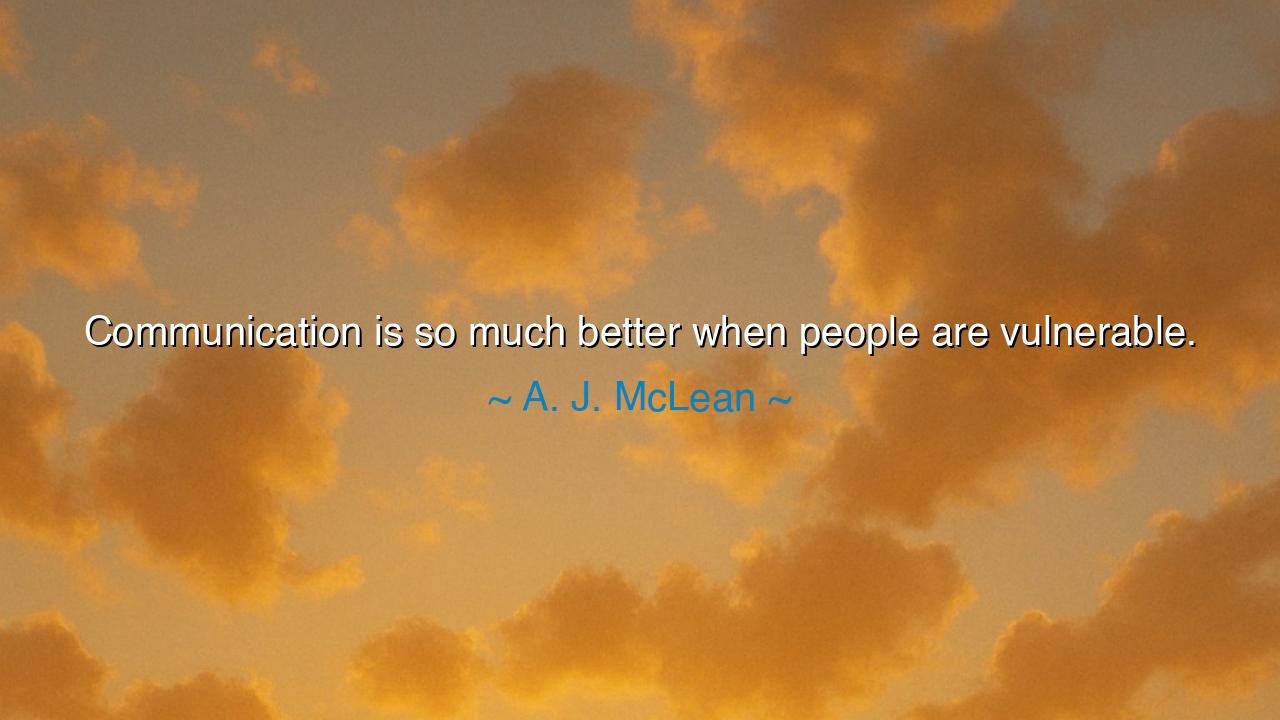
Communication is so much better when people are vulnerable.






Host: The evening city hummed beyond the rain-speckled windows of a downtown recording studio. Inside, the air shimmered with warmth and quiet electricity — the kind of stillness that follows a long day of speaking truths into microphones.
Soft amber light poured over the room’s edges — guitars resting against walls, lyric sheets scattered across the table, two coffee mugs cooling beside a console still blinking with soft blue light.
At the heart of it sat Jeeny, her elbows on the table, her fingers tracing lazy circles around her mug’s rim. Across from her, Jack leaned back in a chair, his gaze distant but alive, the faint smile of someone who’d just said too much and was still trying to decide if that was brave or foolish.
Host: The rain tapped gently against the glass, like percussion to an invisible melody — soft, uncertain, and human.
Jeeny: (quietly) “A. J. McLean once said, ‘Communication is so much better when people are vulnerable.’”
(she looks up, half smiling) “You know, that might be the most unguarded truth ever said by someone who made a living performing.”
Jack: (nodding slowly) “Yeah. Funny, isn’t it? The guy spent years on stage — lights, fame, noise — but he figured out that the strongest thing you can do isn’t performing. It’s admitting.”
Jeeny: “Admitting what?”
Jack: “That you’re breakable. That you care. That the armor you built to survive might be the same thing keeping you from connection.”
Host: The console lights blinked softly, rhythmically, casting moving patterns across their faces — two people lit by the heartbeat of technology but speaking about something older than language itself.
Jeeny: “You ever notice how vulnerability terrifies people more than pain? We’d rather suffer privately than be seen trembling.”
Jack: “Because trembling looks like weakness.”
Jeeny: “And weakness looks like failure.”
Jack: “But really, it’s just truth. The unedited kind.”
Jeeny: (softly) “The only kind that matters.”
Host: She exhaled, the steam from her coffee rising like confession. The silence between them wasn’t awkward — it was intimate, like both were trying to find the courage to peel another layer of themselves away.
Jack: “You know, it’s strange — the more you hide, the less you’re understood. But the more you reveal, the more you risk getting hurt.”
Jeeny: “That’s the paradox of connection. You can’t have real closeness without real danger.”
Jack: “Exactly. Vulnerability isn’t about spilling your secrets — it’s about trusting someone enough to hold them without weaponizing them.”
Jeeny: “And that’s rare.”
Jack: “That’s sacred.”
Host: A single guitar string twanged faintly as if the air itself agreed. The sound carried for a second — delicate, unresolved — like a truth still searching for its landing place.
Jeeny: “McLean knew what he was talking about. He came from an industry where image was everything — where sincerity was stage-managed. But when he says vulnerability makes communication better, he’s talking about liberation.”
Jack: “The liberation of being seen instead of presented.”
Jeeny: “Yes. When you stop trying to be impressive, you start being understood.”
Jack: (smiling faintly) “And that’s when conversation becomes communion.”
Host: The light shifted as a car passed outside, its headlights cutting briefly across their faces, two profiles caught in momentary honesty.
Jeeny: “You ever had that moment — when someone finally says something real, and the air in the room changes?”
Jack: (nodding) “Yeah. It’s like the walls stop listening, and your heart starts.”
Jeeny: “Exactly. That’s what he means — communication becomes alive when people stop performing safety.”
Jack: “And start showing their scars instead of hiding them.”
Host: The rain grew heavier outside, a steady cascade that softened the city’s hard edges. Inside, their conversation had turned into something quieter, more reflective — not a debate, but a confession shared between kindred souls.
Jeeny: “You know, we talk all the time — meetings, interviews, messages — but most of it’s noise. We don’t communicate; we transmit.”
Jack: “Yeah. We use words to protect ourselves instead of expose ourselves.”
Jeeny: “Vulnerability flips that — it’s using words to connect instead of control.”
Jack: “And the minute you speak from that place, people stop listening with their ears and start listening with their lives.”
Jeeny: “Because it’s not the message that moves them — it’s the courage.”
Host: The studio clock ticked softly, its rhythm blending with the rain, with breath, with heartbeat.
Jeeny: (quietly) “I think that’s why songs like his hit people so deeply. They’re imperfect. But they’re human. You can feel the cracks.”
Jack: “Because the cracks let the light through.”
Jeeny: (smiling) “You quoting Leonard Cohen now?”
Jack: (shrugs) “Truth echoes through generations. Same song, different verses.”
Host: The room dimmed, as if even the electricity knew this moment wasn’t about light but warmth. The air between them was heavy with unspoken understanding — a kind of peace that only arrives after honesty.
Jeeny: “You think vulnerability makes us better communicators because it makes us better people?”
Jack: “No. Because it makes us real ones.”
Jeeny: “Real is enough.”
Jack: “Real is everything.”
Host: The camera drew back slowly, catching the studio in wide frame — the glow of the console, the reflection of raindrops sliding down the window, two silhouettes sitting in quiet connection.
And over the hush of rain and the hum of wires, A. J. McLean’s words lingered like an afterthought turned revelation:
Host: That communication isn’t about clarity, but courage.
That honesty isn’t heard unless it’s human.
That the walls we build for safety
are the same ones that keep love out.
Host: The rain slowed,
the city lights blurred to gold,
and Jeeny reached across the table,
placing her hand lightly on Jack’s.
No more words.
Just presence.
Because in the end,
as McLean knew —
communication is only real
when we dare to be vulnerable.






AAdministratorAdministrator
Welcome, honored guests. Please leave a comment, we will respond soon